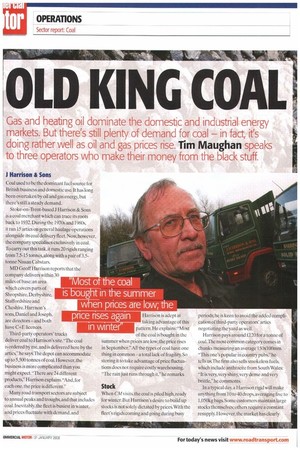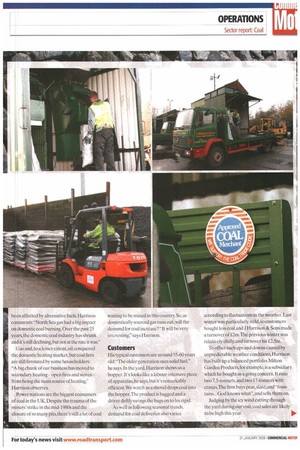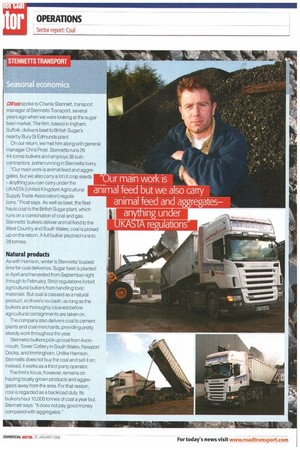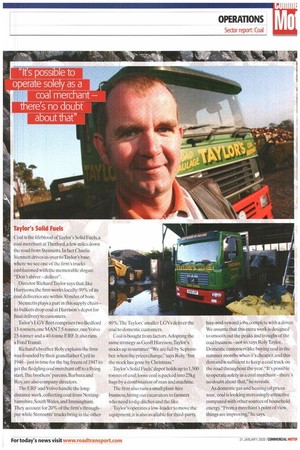OLD K
Page 44

Page 45

Page 46

Page 47

If you've noticed an error in this article please click here to report it so we can fix it.
Gas and heating oil dominate the domestic and industrial energy markets. But there's still plenty of demand for coal — in fact, it's doing rather well as oil and gas prices rise. Tim Maughan speaks to three operators who make their money from the black stuff.
J Harrison & Sons Coal used to be the dominant fuel source for British business and domestic use. It has long been overtaken by oil and gas energy, but there's stilla steady demand.
Stoke-on-Trent-based J Harrison & Sons is a coal merchant which can trace its roots back to 1932. During the 1970s and 1980s, it ran 15 attics on general haulage operations alongside its coal delivery fleet. Now, however, the company specialises exclusively in coal. lb carry out this task, it runs 20 rigids ranging from 7.5-15 tonnes, along with a pair of 3.5tonne Nissan Cabstars.
MD Geoff Harrison reports that the company delivers within 30 miles of base; an area which covers parts of Shropshire, Derbyshire, Staffordshire and Cheshire. Harrison's sons, Daniel and Joseph. are directors and both have C+E licences.
Third-party operators' trucks deliver coal to Harrison's site.-The coal is ordered by me, and is delivered here by the artics," he says.The depot can accommodate up to 5,500 tonnes of coal. However, the business is more complicated than you might expect. "There are 24 different products," Harrison explains. "And, for each one, the price is different."
Many road transport sectors are subject to annual peaks and troughs, and that includes coallnevitably, the fleet is busiest in winter, and prices fluctuate with demand, and Harrison is adept at taking advantage of this pattern. He explains: -Most of the coal is bought in the summer when prices are low; the price rises in September." All the types of coal have one thing in commona total lack of fragility. So storing it to take advantage of price fluctuations does not require costly warehousing. "The rain just runs through it," he remarks.
in winter
Stock When CM visits, the coal is piled high, ready for winter. B ut Harrison's desire to build up stocks is not solely dictated by prices. With the fleet's rigids coming and going during busy periods, he is keen to avoid the added complication of third-party operators' attics negotiating the yard as well.
Harrison pays around f„120 for a tonne of coal.The most common category comes in chunks measuring an average 150x100mm. -This one's popular in country pubs," he tells us.The firm also sells smokeless fuels. which include anthracite from South Wales: "It is very, very shiny, very dense and very brittle," he comments.
In a typical day. a Harrison rigid will make anything from 10 to 40 drops, averaging five to 1,050kg bags. Some customers maintain large stocks themselves; others require a constant resupply. However, the market has clearly been affected by alternative fuels. Harrison comments: "North Sea gas had a big impact on domestic coal burning. Over the past 25 years, the domestic coal industry has shrunk and it's still declining, but not at the rate it was."
Gas and, to a lesser extent, oil conquered the domestic heating market, but coal fires are still favoured by some householders: "A big chunk of our business has moved to secondary heating — open fires and stoves — from being the main source of heating," Harrison observes power stations are the biggest consumers of Coal in the UK. Despite the trauma of the miners' strike in the mid-1980s and the closure of so many pits, there's still a lot of coal waiting to be mined in this country. So, as domestically sourced gas runs out, will the demand for coal increase? "it will be very interesting," says Harrison.
Customers His typical customers are around 55-60 years old: "The older generation uses solid fuel." he says. In the yard, Harrison shows us a hopper. Its looks like a labour-intensive piece of apparatus, he says, but it's remarkably efficient.We watch as a shovel drops coal into the hopper.The product is bagged and a driver deftly swings the bags on to his rigid.
As well as following seasonal trends, demand for coal deliveries also varies according to fluctuations in the weather. Last winter was particularly mild, so customers bought less coal and.' Harrison & Sons made a turnover of f2m.The previous winter was relatively chilly, and turnover hit £2.5m.
To offset such ups and downs caused by unpredictable weather conditions, Harrison has built up a balanced portfolio. Milton Garden Products,for example, is a subsidiary which he bought as a going concern. It runs two 7.5-tonners, and two 17-tonners with cranes.The firm buys peat, slate, and -fountains... God knows what", and sells them on.
Judging by the icy wind cutting through the yard during our visit, coal sales are likely to be high this year. CMIast spoke to Charlie Stennett, transport manager of Stennetts Transport, several years ago when we were looking at the sugar beet market. The firm, based in Ingham, Suffolk, delivers beet to British Sugar's nearby Bury St Edmunds plant.
On our return, we met him along with general manager Chris Frost. Stennetts runs 26 44-tonne bulkers and employs 38 subcontractors, some running in Stennetts livery.
"Our main work is animal feed and aggregates, but we also carry a lot of crop seeds —anything you can carry under the UKASTA (United Kingdom Agricultural Supply Trade Association) regulations." Frost says. As well as beet, the fleet hauls coal to the British Sugar plant, which runs on a combination of coal and gas. Stennetts' bulkers deliver animal feed to the West Country and South Wales; coal is picked up on the return. A full bulker payload runs to 28 tonnes.
Natural products
As with Harrison, winter is Stennetts' busiest time for coal deliveries. Sugar beet is planted in April and harvested from September right through to February. Strict regulations forbid agricultural bulkers from handling toxic materials. But coal is classed as a natural product, so there's no clash, as long as the bulkers are thoroughly cleaned before agricultural consignments are taken on.
The company also delivers coal to cement plants and coal merchants, providing pretty steady work throughout the year.
Stennetts bulkers pick up coal from Avonmouth, Tower Colliery in South Wales, Newport Docks, and Immingham. Unlike Harrison, Stennetts does not buy the coal and sell it on; instead, it works as a third-party operator.
The firm's focus, however, remains on hauling locally grown products and aggregates away from the area. For that reason, coal is regarded as a backload duty. Its bulkers haul 10,000 tonnes of coal a year but, Stennett says: "It does not pay good money compared with aggregates."
ylor's Solid Fuels
Oat is the lifeblood of Taylor's Solid Fuels, a tOal merchant at Thetford, a few miles down the road from Stennetts. In fact Charlie Stennett drives us over to Taylor's base, where we see one of the firm's trucks emblazoned with the memorable slogan: "Don't shiver—deliver".
Director Richard Taylor says that, like Harrisons, the firm works locally 99% of its coal deliveries are within 30 miles of base.
Stennetts plays a part in this supply chain — its bulkers drop coal at Harrison's depot for final delivery to customers.
Tailor's LGV fleet comprises two Bedford 13-tonners, one MAN 7.5-tonner,oneVolvo 25-tonner and a 40-tonne ERE It also runs a Ford Transit.
Richard's brother Roly explains the firm Was founded by their grandfather Cyril in 1946 —just in time for the big freeze of 1947 to get the fledgling coal merchant off to a flying start.The brothers' parents, Barbara and Roy, are also company directors.
The ERF and Volvo handle the longdistance work, collecting coal from Nottinghamshire, South Wales, and Immingham. They account for 20% of the firm's throughpin while Stennetts' trucks bring in the other 80%.TheTaylors' smaller LG Vs deliver the coal to domestic customers.
Coal is bought from factors. Adopting the same strategy as Geoff Harrison,Taylor's stocks up in summer: "We are full by September, when the prices change," says Roly," but the stock has gone by Christmas," Taylor's Solid Fuels' depot holds up to 1,500 tonnes of coal; loose coal is packed into 25kg bags by a combination of man and machine.
The firm also runs a small plant-hire business, hiring out excavators to fanners who need to dig ditches and the like.
Taylor's operates a low-loader to move the equipment; it is also available for third-party, hire-and-reward jobs, complete with a driver. We assume that this extra work is designed Lo smooth out the peaks and troughs of the coal business—not so, says RolyTaylor. Domestic customers like buying coal in the summer months when it's cheaper, and this demand is sufficient to keep a coal truck on the road throughout the year. "It's possible to operate solely as a coal merchant — there's no doubt about that," he reveals.
As domestic gas and heating oil prices soar, coal is looking increasingly attractive compared with other sources of household energy. "From a merchant's point of view, things are improving," he says.
































































































































































